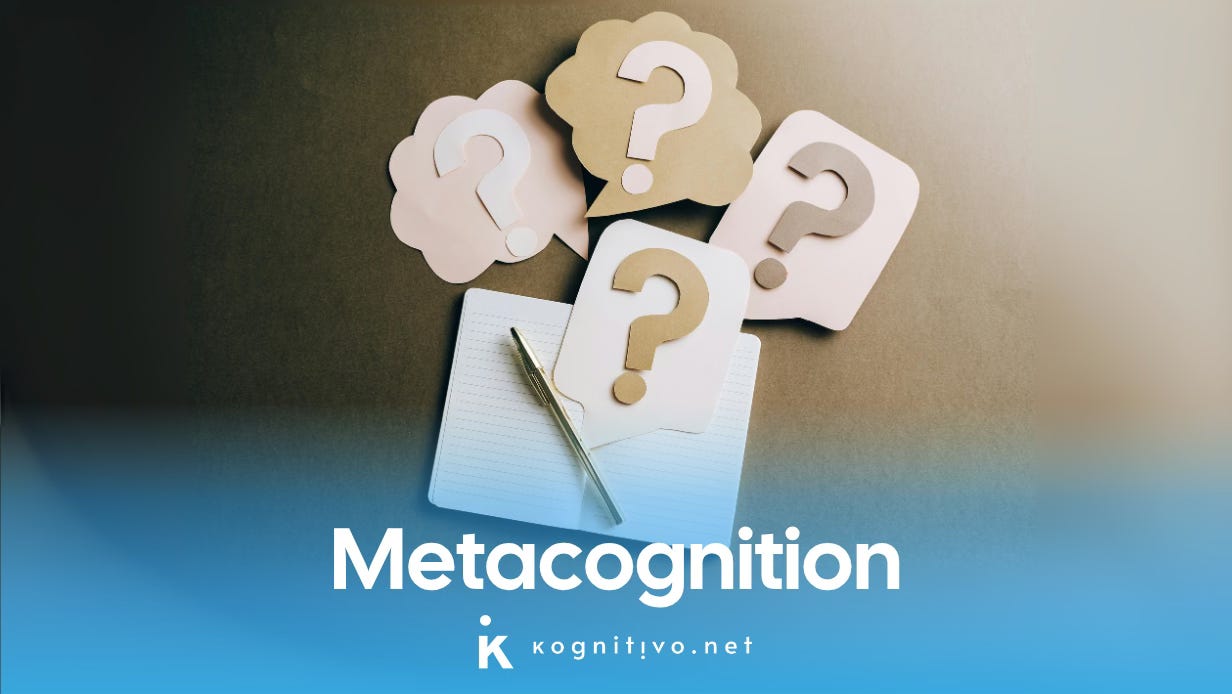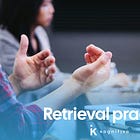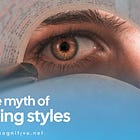Don't trust your brain: the importance of metacognition
Learning is a deeply deceptive experience: your brain will try to trick you into believing you know more than you do. Metacognition is how you undo the illusion.
If I asked you, what's the best predictor of academic success, what would you say?
Most people would point to IQ. Or maybe how hard someone studies or how much time they put into preparing for exams.
But research shows something more surprising: one of the strongest predictors of academic success, often more so than raw intelligence or effort alone, is metacognition.
What is metacognition?
Metacognition is the ability to think about and manage your own thinking. It’s how you reflect on what you know, how you’re learning it and what you should do next. It’s thinking about thinking or learning about learning.
To make the idea clearer: I have a shopping bag full of other shopping bags at home, and I bet you have one too. I jokingly call it the "meta-bag", a bag that holds other bags or a "bag of bags". Similarly, metacognition is thinking that holds thinking. Cognition about cognition. The brain stepping back to look at what the brain is doing.
It involves being aware of your cognitive processes, recognizing when you understand something and, critically, when you don’t. It also includes knowing how to adjust your strategies accordingly. In short, metacognition turns learning from a passive experience into an intentional one.
Meta... what?
Metacognition sounds abstract, but it's deeply practical. And it’s probably the thing you’re not doing when you say, “I studied for hours and still didn’t get it.”
Let’s debunk a few myths:
Myth 1: “I know how I learn best.”
Usually false. Without conscious reflection and experimentation, people tend to repeat what feels comfortable, not what works. We also tend to gravitate towards non-scientific ideas such as learning styles.Myth 2: “If it feels easy, I must be getting it.”
Nope. That’s the illusion of fluency again. Real learning often feels clumsy and effortful.Myth 3: “Some people are just naturally good learners.”
There’s no such thing as an effortless genius. What looks like born talent is often the result of metacognitive habits that have been so skillfully mastered that they appear innate. But they were built, not born.
The process of learning is a deeply deceptive experience. How it feels often has little to do with how well it works: learning often feels productive without being productive. But once you start seeing learning as a system you can monitor and steer, not just endure, you unlock a different level of cognitive control.
Let's break it down
The cognitive scientist J. H. Flavell introduced the now-classic distinction of metacognition into three overlapping types:
Metacognitive knowledge: What you know about your learning. For example: “I learn better when I quiz myself,” or “Math problems take more effort to stick.”
Metacognitive monitoring: What you notice while you’re learning. “This part is confusing,” or “I think I remember this, but not well.”
Metacognitive control: What you do with the insights gained from monitoring: changing tactics, skipping ahead or slowing down to focus where it’s needed.
Each of these metacognitive types reinforces the others, and studies suggest that while control often has the most visible impact on performance, it’s hard to develop without first building knowledge and monitoring skills.
I know what you’re thinking: all of this sounds obvious, doesn’t it? Check that you’re understanding, monitoring your study… It’s pretty commonsensical in theory. But in practice, you probably skip this entirely as most students do according to research. You probably treat learning like a checklist: read chapter, highlight text, solve problems, repeat. When pressed for time, you’re likely to skip reflecting on your learning altogether. And that’s when your brain tricks you again into unconsciously mistaking activity for progress and confusing effortlessness with understanding.
Why we're bad at metacognition
Like other signs of mastery, such as knowledge transfer, metacognition is rare. Beyond the fact that we tend to avoid it simply because it takes time and effort, there are a couple of additional and arguably more interesting reasons.
The judge and the judged
We often find it awkward to ask ourselves questions and answer them honestly. It can feel like performing on an empty stage, with only our own applause as a response: shouldn't the judge and the person being judged be two different people? We're so conditioned to seeking external validation, such as grades, feedback and exam results, that trusting our own judgement can seem like cheating.
However, this is a consequence of years of learning focused on performance (exams, presentations, etc.) rather than long-term growth. Learning to question ourselves isn’t just about study habits. It's about developing the kind of honesty and self-confidence that leads to real success, not just when we're studying.
The unreliable narrator
We also tend to be unreliable narrators of our own learning. We tell ourselves neat stories about what worked, when in reality we’re often mostly guessing. The more we master a skill, the harder it is to remember how we got there, and the more likely we are to craft a beautiful story that hides the reality of an often messy, effortful process. Without reflection, we end up trusting that superficial story instead of the actual process.
Metacognition isn’t just a skill. It’s a mindset. One that runs counter to instinct, but pays off over time.
How to get better at metacognition
So what can we do to develop this elusive skill? The answer isn’t a one-off magic trick. It’s a set of habits, reflections, and small shifts in perspective that compound over time. Let's get into it.
Practical techniques
Let’s start with the practical stuff. Here are three simple techniques you can implement in your learning routines to start developing metacognition.
Ask yourself questions. Not rhetorical ones, real prompts like: “What do I already know?” or “How will I know if I’ve understood this?” These small check-ins build metacognitive awareness.
Delay your feedback. Come back later and try to recall or explain what you learned without notes. Struggle shows you where the gaps are.
Use retrieval, not review. Retrieval practice is one of the most efficient study techniques out there and it fosters metacognition by the very nature of how it works: it makes you aware of what you don't know.
Habits and routines
An effective way to develop metacognition is to turn reflection into a habit. You can do this at different times: through structured post-task routines, short reflections after study sessions or daily check-ins.
Ask yourself: “What worked well?”, “Where did I get stuck?”, “What will I do differently next time?”. But don’t just reflect after the fact, make it a habit to also check your understanding as you go, by asking yourself questions like “Can I explain this in my own words?” or “What’s the tricky part here?”
This isn’t busywork, it’s how experts learn from the process, not just the outcome.
Narrative shift
Finally, change your identity. Stop being just the learner and become your own coach. The goal isn’t to feel smart while studying. It’s to improve your learning gradually through reflection. And that means learning to sit with discomfort, normalizing your internal dialogue (talking to yourself and asking yourself questions) and being at ease with regularly dealing with your own gaps or failures, as this is the only path to improvement.
The good news? Once you start thinking about how you think, it gets easier to notice when you’re fooling yourself. And that’s when real learning begins.
It comes down to honesty
Our brains don't come with preset glowing progress bars for learning. Metacognition is how we bridge that gap. It won’t make learning feel easier. But it will make it more honest, and ultimately, more effective. Once you know how to check in with yourself (not just coast on feelings) you stop mistaking comfort for progress. You stop narrating your learning like a fable, and start living it like a practice.
In a sense, metacognition is a concrete way of embodying the ideal that the ancient Greeks fervently advocated: ‘Know thyself’ (γνῶθι σεαυτόν), or as Socrates somewhat radically put it: an unexamined life is not worth living. Become the master of your own thoughts and learn to regulate them to achieve true freedom and mastery.
Keep learning
Prompt suggestions. Always ask follow-up questions
I want to improve my metacognition while studying. Can you help me build a short routine with reflection questions before, during, and after a study session?
Act as a learning coach. I often feel like I understand something, but later realize I don’t. How can I tell the difference between actual understanding and the illusion of fluency?
Act as a teacher and test me using retrieval practice on “metacognition and its role in learning.” Ask me 6 questions, one at a time, only moving on when I answer. Make them progressively harder.
Links
📑 Metacognition and cognitive monitoring: A new area of cognitive–developmental inquiry: This is a classic article on the topic of metacognition, widely understood to have laid groundwork for the field and introduced core distinctions in metacognitive processes. It’s short and easy to read.
📄 Metacognition by Cambridge Assessment: Here’s a simple yet detailed explainer PDF on the concept of metacognition by Cambridge International Education. It includes an extensive list of literature for further reading. It's a great read to follow on from this article.






Excellent article and so true. I wish the schools today are using this principle…
Thank you for describing this in such detail - and with such great examples too - Javier! I thought that I had more or less understood metacognition, but you’ve helped clarify the concept for me.